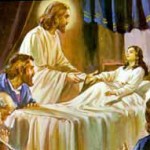Being Saint Luke’s People
A sermon preached by Christopher L. Webber on St. Luke’s Day, October 18, 2015, at St. Luke’s Church, San Francisco.
St. Luke was a doctor – as far as we know. St Paul calls him “the beloved physician,” but there’s also a tell-tale passage in the gospels where Mark tells a story about a woman who, he says, “had endured much under many physicians, and had spent all that she had; and she was no better, but rather grew worse.”(5:26) Well, that’s not a nice thing to say about doctors so Luke tells the story differently. Dr. Luke says, “she had spent all she had on physicians, and no one could cure her.” (8:46) So it looks as if Luke was a doctor; there does seem to be some self-interest at work there. But the Gospel according to Luke also shows a doctor’s natural interest in symptoms. He describes the diseases Jesus healed in more detail than the other gospels. But whether it’s Luke or Matthew or Mark or John it’s clear that Jesus was primarily a healer. Yes, people came to hear him teach, but perhaps even more they came to be healed and the apostles carried on that ministry and the church has always done the same.
St. Luke’s Hospital, San Francisco, one of the oldest hospitals in the city and now one of four campuses of California Pacific, was founded by an Episcopal priest in 1871. There are at least half a dozen Episcopally sponsored hospitals named for St Luke all over the United States and more overseas. My wife was born in St Luke’s Hospital, Tokyo. I looked around on line and discovered St Luke’s hospitals everywhere – in Bethlehem PA and Maumee Ohio and Chesterfield Missouri and Duluth Minnesota and Boise Idaho and they weren’t always founded by Episcopalians. (St. Luke may or may not have been an Episcopalian himself. I think he was but there’s no clear evidence.) But I noticed that while the hospital in Houston is called St Luke’s Episcopal Hospital it’s usually hard to find any reference to denominational identity. More often, whatever the founding church may have been, you find references to ecumenical chaplaincy services and interdenominational chapels and it’s clear that the ministry being done, like that of Jesus, is based purely on need. And of course that’s the way it should be.
Hospitals surely are first of all for healing, for carrying on Jesus’ ministry of healing, and it’s more important now, I think, than ever to emphasize the ministry of healing in all its dimensions. There was a time when doctors seemed to feel that they could do it all – just get the right science, right pills, right surgery, and all will be well – but I think they’ve come to recognize that human beings are not simply physical beings who can be fixed, but  spiritual beings also whose physical healing sometimes is advanced or retarded by spiritual things. It’s all very well to be hooked up to tubes and machines but we need also to be visited, we need the human touch, we need to be in relationship with others. That’s why Episcopal churches more and more often have a pastoral care team that includes lay people some of whom may have a special gift for that ministry and exercise it as they do here at the end of the Sunday liturgy and at the mid-week service also. Yes, the priest needs to go and take communion and the holy oils for anointing but there needs to be also that human contact with other members of the community. There are still, I think, a good many doctors who don’t understand that, but I think most of us choose our doctors for their human touch more than their credentials and technical skills and sometimes the human touch is really more important.
spiritual beings also whose physical healing sometimes is advanced or retarded by spiritual things. It’s all very well to be hooked up to tubes and machines but we need also to be visited, we need the human touch, we need to be in relationship with others. That’s why Episcopal churches more and more often have a pastoral care team that includes lay people some of whom may have a special gift for that ministry and exercise it as they do here at the end of the Sunday liturgy and at the mid-week service also. Yes, the priest needs to go and take communion and the holy oils for anointing but there needs to be also that human contact with other members of the community. There are still, I think, a good many doctors who don’t understand that, but I think most of us choose our doctors for their human touch more than their credentials and technical skills and sometimes the human touch is really more important.
Health care, of course, is headline news these days so it’s good that we have St Luke to think about while the country tears itself apart about health care reform because it reminds us, I think, that we need to have some input as Christians, and too often the so-called Christian input is negative and has not very much to do with the Bible. But I think there is a positive Biblical perspective and it begins with Jesus and even that very basic question: “What would Jesus do?” Because I’m pretty sure that Jesus would not suggest that health care ought to be based on what kind of insurance you have. I don’t remember that he ever asked who would pay the bill. So you can argue if you want about how to pay for health care and how to provide it, but I don’t think that we as Christians can argue that there should be anyone left out. If the system we have leaves anyone out, and it does, that system is not a Christian system. Well, it’s not a Christian country either but our role as Christians is to advocate for the best as we understand it and we’re not there yet and we can hold up a higher standard – good health care for all and no one left out.
We hear these angry debates over universal health care and for Christians it can’t be an issue. Of course there should be universal health care – in fact we have it already – no one gets turned away from an emergency room. The only issue is who should provide it and who should pay for it. We not only have universal health care already, we pay for it already – but we pay too much for it because the uninsured cost money and you and I pay their bills in taxes and premiums. And we pay more than we ought to because the uninsured don’t get preventative care and therefore cost more when they come to the emergency room. So the system we have is stupid and it’s expensive and it doesn’t need to be. The issue isn’t whether to do it but how to do it and we need to work that out and it would help if we could do it calmly and rationally.
We get hung up on slogans and irrational fears. Everyone, for example, from the president on down agrees we shouldn’t provide health care for illegal aliens. But we do! We already do – and we already pay for it – and we should pay for it. There’s no clearer message in the Bible than the command to care for the alien in your midst, so the question again isn’t whether but how. And it shouldn’t be that hard to figure it out. Most other industrialized countries have figured it out already and its ridiculous for a country with this many Christians to be left behind. This is not, of course, a Christian country; I don’t think it ever really was but I hope the church has an influence and that Christians will use their voices and votes to see that however we wind up no one is left out, that no one is left out, unless you can imagine Jesus leaving someone out because they couldn’t afford his visit.
It’s about healing. Luke wants us to see the healing ministry of Jesus. The world has been changed by Jesus’ ministry whether you are Christian or not and St. Luke is the great witness to that aspect of Jesus’ ministry. So St  Luke tells us about Jesus as a health care provider and that’s important to think about but Luke has much more to say than that because healing, as I said, isn’t just about physical bodies and healing involves not just individuals but societies also. Societies get sick and need healing. When you find people shouting at each other and calling each other names that’s a sick society and it needs healing too.
Luke tells us about Jesus as a health care provider and that’s important to think about but Luke has much more to say than that because healing, as I said, isn’t just about physical bodies and healing involves not just individuals but societies also. Societies get sick and need healing. When you find people shouting at each other and calling each other names that’s a sick society and it needs healing too.
It’s partly, I think, the increasing divisions in our country between wealth and poverty that cause the trouble. Last year American chief executives earned 262 times the average wage of their workers and that was ten times more than the difference back in 1970. So we hear about chief executives and others with incomes beyond what most of us can imagine and then when jobs disappear and homes get foreclosed even if it’s not your job or your home but just someone you know it makes you nervous and angry and no wonder we get people shouting at each other.
How can we deal with that anger? I don’t think the churches help as much as they should and could because so many of them emphasize individual salvation. Do you know the old hymn that begins, “I come to the garden alone”? It’s all about me and Jesus: “And he walks with me and he talks with me and he tells me I am his own . . .” Too many hymns begin with the word “I.” But when you put the emphasis on “me” and my feelings and my relationship with Jesus and how I feel and my emotions it turns the focus away from my neighbor’s needs and society as a whole and the corporate, social healing we need.
St. Luke emphasizes the corporate dimension of healing. He makes a point of the social dimension. None of the other gospels has as much to say as St Luke about the divisions between rich and poor. Luke starts out with Mary’s song the Magnificat, and her praise for a God who puts down the mighty and lifts up the lowly, who sends the rich away empty and fills the hungry with good things.
There have been churches and there have been religions that saw wealth as a sign of God’s favor and poverty as evidence of sin, but certainly St Luke doesn’t see it that way. In Luke’s version of the Sermon on the Mount it’s not “Blessed are the poor in spirit.” That’s the way Matthew reports it, but Luke tells us that Jesus said, “Blessed are the poor . . . and woe to you who are rich.” It is not God’s will that some prosper while others suffer. There’s a social healing we need; greater and greater divisions are a sign of sickness  in a society and the church’s job is to heal, to look for common ground, to reconcile, to bring together, to unite.
in a society and the church’s job is to heal, to look for common ground, to reconcile, to bring together, to unite.
I wonder whether we Anglicans have gone at it the wrong way too because we also are becoming divided by social issues instead of healing them. I wonder whether our traditional emphasis on reason isn’t helpful because the divisions aren’t rational divisions whether it be anti-abortion and pro-choice, whether it be for or against illegal aliens, whether it be for or against gay marriage. There are reasons on both sides but also deep emotions on both sides and emotions can override reason. I think we need to realize that these divisions are sometimes too deep for rational discussion. We feel them too deeply to be influenced at an intellectual level. I don’t think we usually choose up sides after thinking it through carefully and weighing the arguments. Sexuality, for instance, isn’t usually a matter of rational choice, is it? – I mean, if you’re married, was that a rational choice? Did you sit down and weigh the factors for and against? I don’t remember that I did! So emotions may trump reason, but part of growing up is learning to control emotions, recognizing them, and keeping them in check if we can – if we can – but we should realize at the least what’s happening and the need for time and space to calm down and listen to each other and try to find ways to live together in peace.
We surely know that shouting doesn’t change any minds We know it; lots of others don’t. but, you know, reasoning doesn’t always change minds either. Have you tried reasoning with the NRA? But when was the last time you saw a television commercial that just laid out the facts, the scientific data, the logical reasons for buying this or that – whether drugs or cars or furniture or detergents? No, what you get is an appeal to the emotions and what gets through to your emotions may not speak to me at all, may just turn me off. Thank goodness for the remote control so I can turn the TV off. There are certain commercials that make me automatically hit the “mute” button. But it does appeal to someone or they wouldn’t do it.
So how do we find ways to live together in spite of the differences. How do we learn to open ourselves to God’s ability to change us and heal us and unite us in spite of ourselves. Doesn’t it begin right here? If it were easy, we wouldn’t be here would we? And if there were another way to do it, we wouldn’t be here on Sunday morning would we? But healing takes time and patience and commitment and that’s why we’re here. It’s why we have programs here on the death penalty and gun violence and support Rivers ministry to the homeless and the Saturday food bank. And the mission last year to the Philippines. It’s all about Healing, trying to be St. Luke’s people healing a sick world. And God needs us to be here and so does our society. So tell people about it, bring others with you, because what matters is what St. Luke talked about – God’s healing – God’s healing power – proclaimed in the gospel and available in the church and lived out daily, right here, right now, day by day, by each of us trusting in God’s healing strength.
To heal, to heal, to heal: it was Jesus’ ministry, it’s our ministry to our nation, to our neighbor. Let’s be doing it.
 Christopher L. Webber
Christopher L. Webber